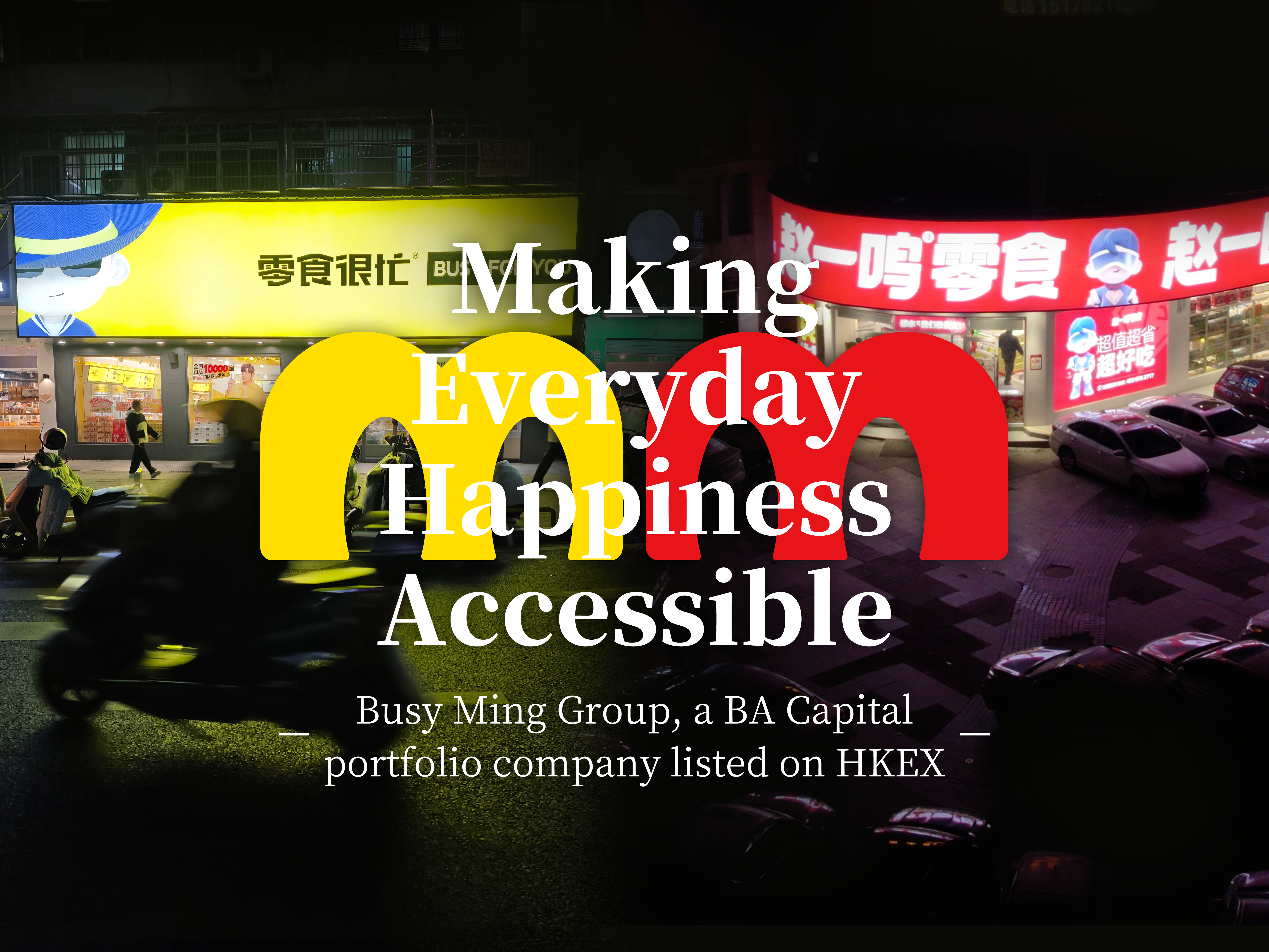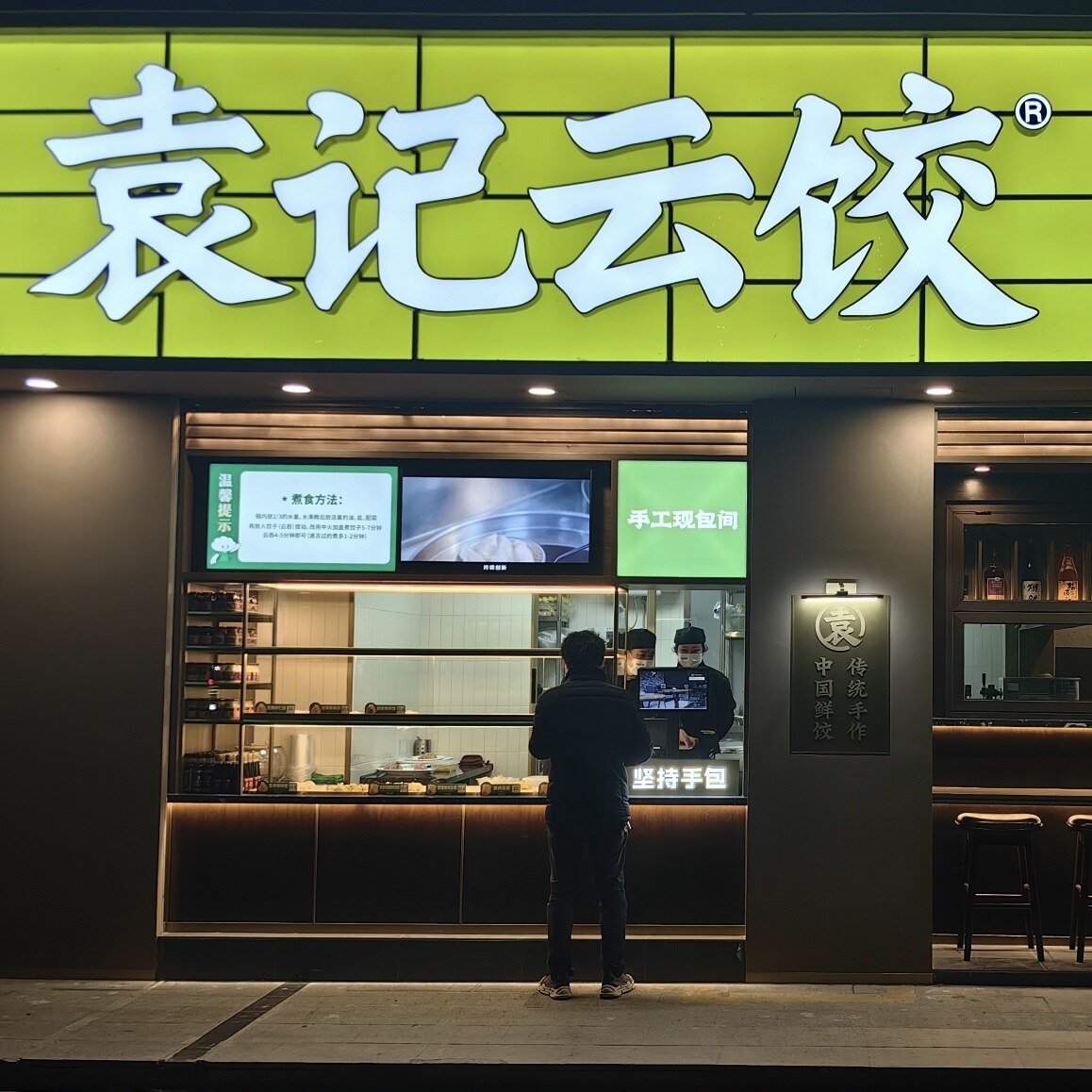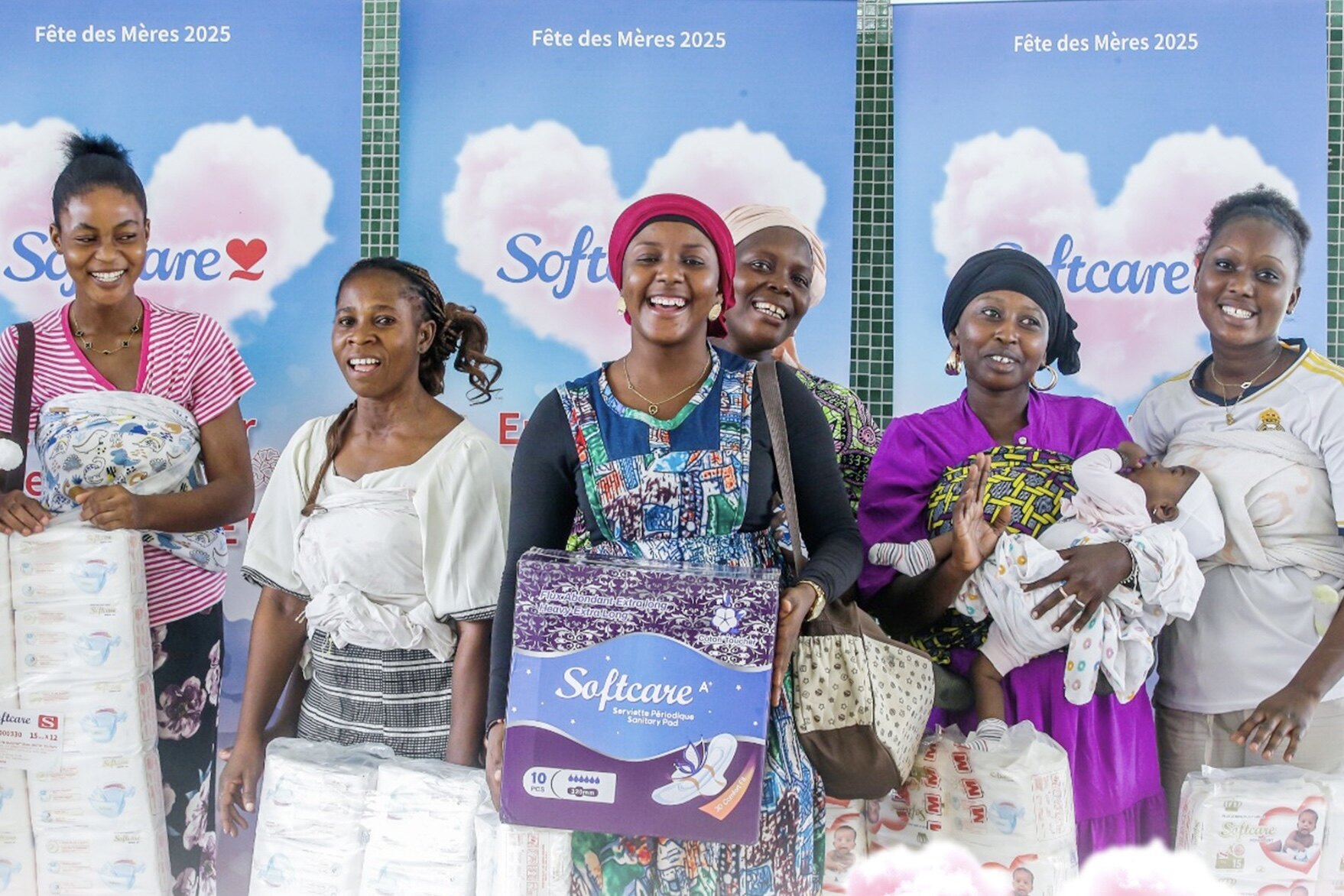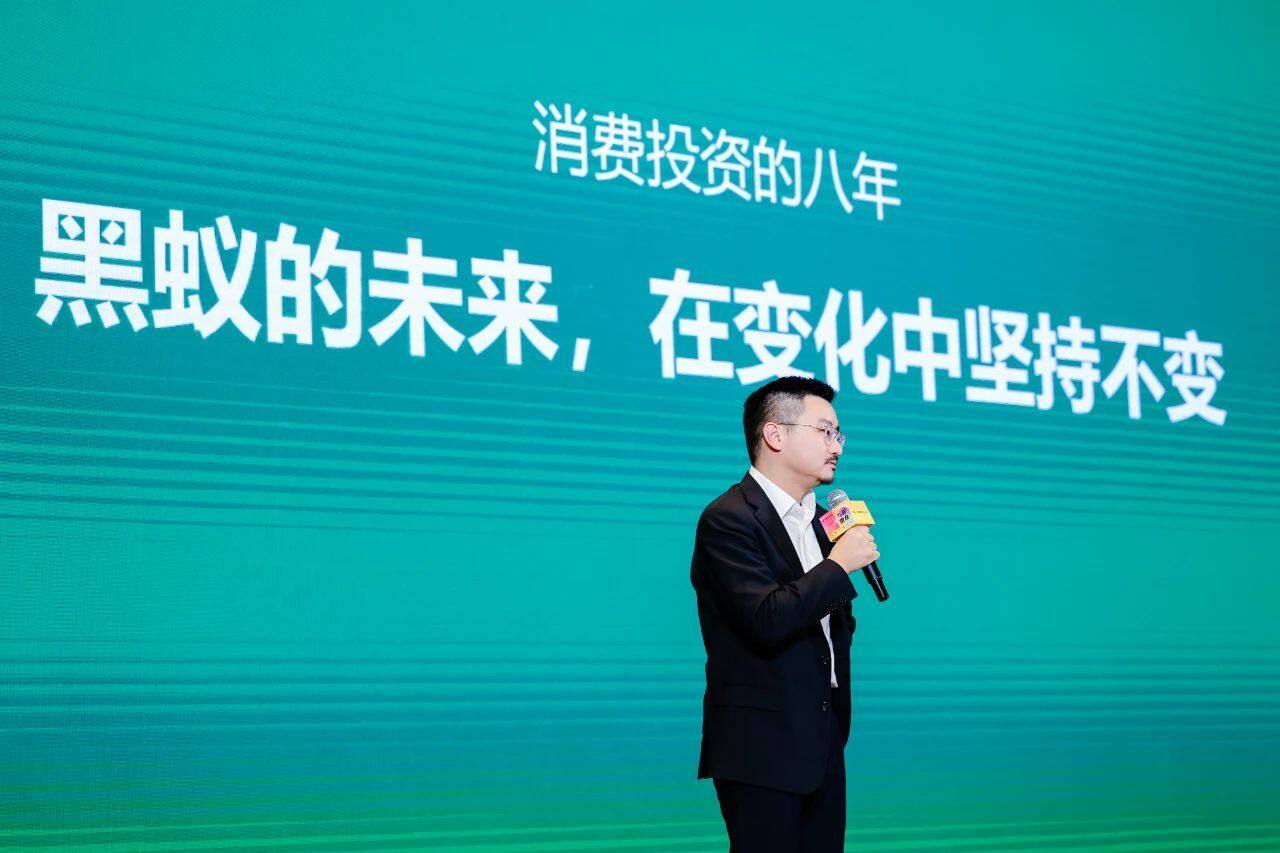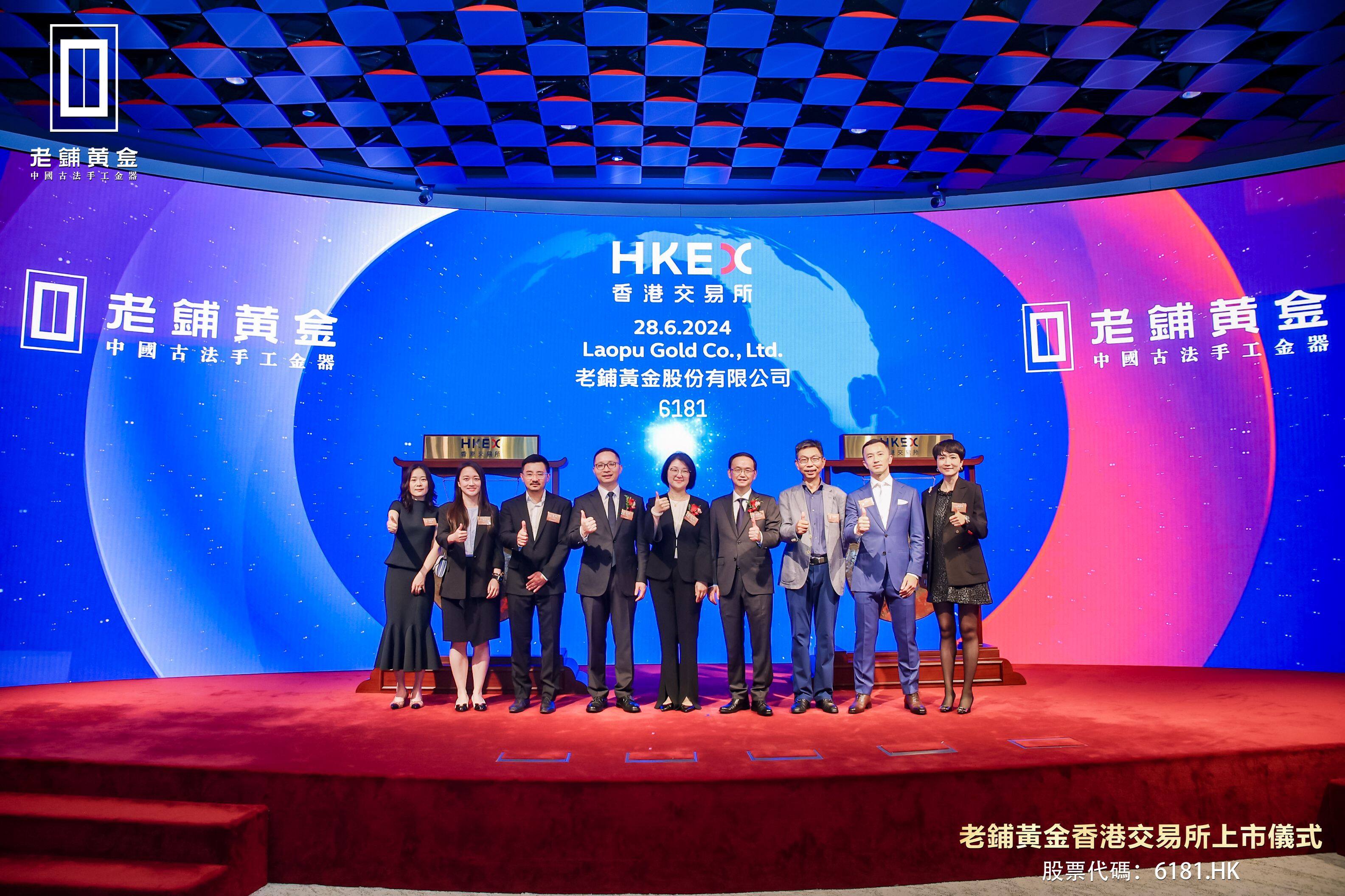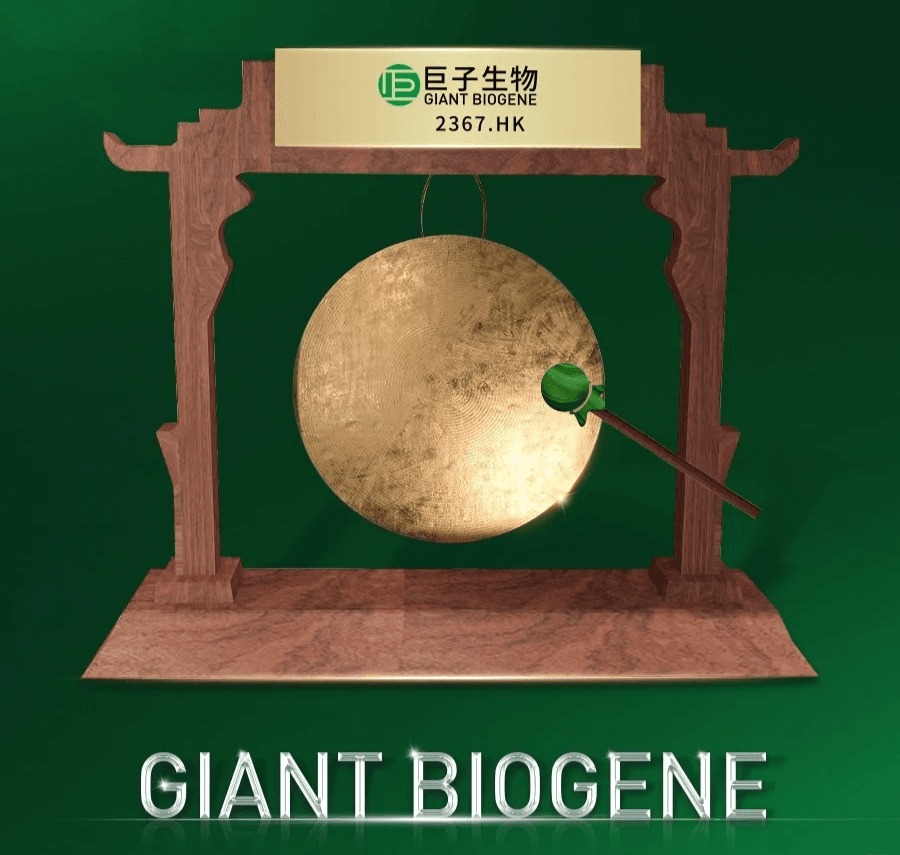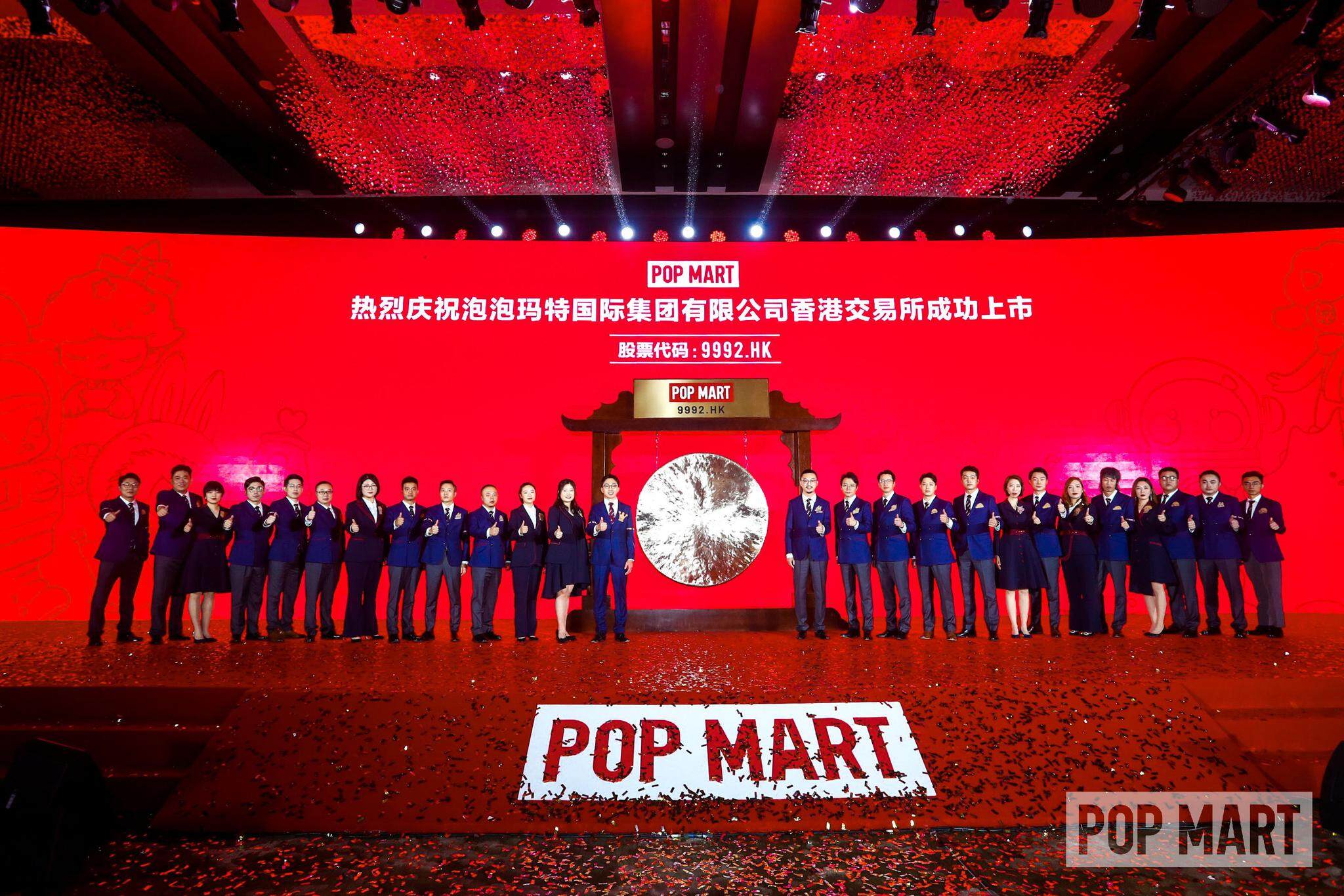Recently, David He, Managing Partner of BA Capital, participated in an in-depth interview with the venture capital media "Waves".
Waves is one of China’s most influential venture and investment media platforms. It is part of 36Kr, one of China’s leading business and technology media outlets, widely regarded as a key reference for understanding the evolution of China’s business environment.
During the conversation, David He shared the investment stories and rationale behind BA Capital's decisions to invest in Laopu Gold and POP MART. He also opened up about his own and BA Capital's entrepreneurial journey.
This interview is originally published in "Waves" and authored by Liu Jing. The following text has been translated from Chinese and edited for clarity.
Talking about "new consumption" seems rather outdated these days.
The last heated discussions on the topic took place three or four years ago, followed by a long silence. In this cycle of boom and bust, BA Capital stands out as one of the most representative funds—perhaps even the most representative one.
At the end of 2020, BA Capital made a stunning debut alongside POP MART, which reached a market valuation of over 100 billion CNY upon its IPO. Shortly after, the firm raised a new RMB fund and a USD fund, totaling approximately ¥4 billion, making it the largest fundraising in the consumer sector that year.
However, the consumer industry quickly fell into a downturn, and consumer investment was gradually forgotten. It wasn’t until June 2024, when Laopu Gold listed on the Hong Kong Stock Exchange, that attention returned. Its stock price surged more than 20-fold from its IPO price, and its market cap once approached HK$150 billion. Six months before its IPO, Laopu Gold conducted its only fundraising round in 15 years, with BA Capital as the lead investor.
For BA Capital, the four years between these two IPOs were bittersweet. They navigated pitfalls, took detours, celebrated successes, and experienced disappointments. "But we never thought of leaving," said David He, Managing Partner of BA Capital, adding that they were fortunate to eventually find their way back to the right path.
Recently, "Waves" interviewed David He. While the conversation started with Laopu Gold, it also delved deeply into the fund’s quiet four years and its more distant past. Through this, one can rarely get such a complete view of a fund’s entrepreneurial journey.
Perhaps due to experiencing several reversals, David He has given more thought to the boundaries of an investor’s capabilities. At a time when everyone is championing AI and technology, he expressed a desire to preserve his independence from the AI trend, even though he recognizes that technology has long overshadowed consumer goods and consumer investment.
While this stance may reflect his self-awareness as a consumer investor, it also reveals his conviction in investing.
Laopu Gold’s Customers Are Those Who Buy Cartier, Not Traditional Gold Shops
Waves : There are many versions of the story behind your investment in Laopu Gold circulating in the market. What’s the real story?
David He : We first heard of the company in 2019. Michael Zhang (another Managing Partner at BA Capital) visited the founder, Xu Gaoming. We expressed interest in investing then, but no opportunity was available.
It wasn’t until the second half of 2023 that intermediaries began introducing investors to the company — but we did not go through an intermediary. Instead we decided on our own initiative to reconnect with the founder, Xu Gaoming, and learned they were planning a Hong Kong listing. Then we led that round.
Waves : That sounds very straightforward. It was the only funding round before Laopu’s IPO. Why did they choose you to lead it?
David He : It was just meant to be — our persistence finally led to a breakthrough.
We believed Laopu was a rare and excellent brand and kept them in mind. So even though there was no investment opportunity in 2019, we remained in contact. Mr. Xu remembered and appreciated our early visits and research.
Moreover, in 2023, while the company attracted some preliminary interest, few investors were seriously engaged. The market environment remained challenging, characterized by tough fundraising conditions and weak investor sentiment. The significant non-consensus primarily existed due to two major cognitive gaps: one concerning the understanding of Laopu's core business, and the other about the conviction in its future trajectory.
Waves : There remains non-consensus today. Some see Laopu as an affordable alternative to luxury jewelry; others think it’s not much different from traditional gold shops.
David He : When I first heard about this company, I visited its Beijing SKP store. At that time, it was still an island counter, but my first impression was that its gold wasn’t the usual bright shade—it was darker, giving a heavier, more historical feel, reminiscent of the Forbidden City or a museum. That was my immediate, intuitive impression.
As I learned more about the company, I realized that Laopu’s products, stores, and service planning are all part of a cohesive cultural system. Walking into any of their stores, you can clearly sense a unified and recognizable design. They’ve integrated traditional Chinese culture into every aspect of the brand—it is a brand built entirely around Chinese traditional culture.
Waves : But is culture alone enough? Some joke that Chinese people can make anything—except a true luxury brand.
David He : Building a high-end brand requires systematically developing products, content, channels, and services targeted at high-net-worth individuals. Constructing a culture-centric system like that is extremely difficult, and there have been very few successful cases domestically in the past.
Refining such a system requires restraint and discipline. In our investment philosophy, we distinguish between efficiency-driven and experience-driven companies: the former must charge ahead early to build scale, while the latter must practice restraint in their early stages.
Take Laopu as an example: from the start, they chose only the best location and avoided mid-to-low-end malls. In a huge market like Shanghai, Laopu had only one store in Yuyuan for a long time. They insisted on not opening new stores unless the perfect location was available, waiting over a decade for the right opportunity. That’s determination.
Furthermore, I believe there will be more culture-driven brands in the future.
Waves : Compared to other luxury brands, which often require long-term brand building, hasn't Laopu Gold's rise been too rapid?
David He : Today’s media environment accelerates brand breakout and amplifies brand effects—the better Laopu Gold sells, the more the media writes about it, and the greater the attention it attracts.
Waves : Was the price-to-earnings ratio once exceeding 130 times too high? Even Hermès' historical peak P/E ratio was only around 60 times.
David He : I believe the company's long-term fundamentals are strong. In the short term, it depends on the delivery of their performance.
Waves : Many once-popular consumer brands have struggled with the issue of "fashion risk."
David He : I don't think Laopu Gold will face that. What kind of products remain perpetually popular, essentially unchanging? First, they must align with the fundamental needs of human consumption—those outlined in Maslow's hierarchy of needs. Secondly, gold never goes out of style, and ancient craftsmanship is timeless. These are elements preserved through thousands of years of traditional Chinese culture.
Moreover, this is a company built around cultural creativity and interpretation—very different from the product-centric, especially standardized-product-focused brands we’ve encountered before. Everything we see at Laopu today embodies its brand values, all of which were built from the ground up by the founder.
I've visited many luxury stores where the staff sizes you up as soon as you enter: Are you genuinely here to buy? What's your spending power? Even if you have money, it feels uncomfortable. But at Laopu you can stroll more leisurely and experience sincere service and equal treatment. Their staff do not rely on sales incentives. That service difference reflects the brand’s culture.
Waves : You repeatedly mention Laopu’s product and brand building. Do these inspirations all come from the founder, Xu Gaoming?
David He : I believe so. Mr. Xu has decades of experience in gold products and has deep knowledge of Buddhism and art. So, when people criticize their low R&D expenses, the key actually lies with the founder.
Waves : Over the past year, gold prices have surged wildly. Many buyers of Laopu may also be motivated by preservation and appreciation of value. If gold prices fall, can Laopu Gold's growth continue?
David He : Laopu has indeed replaced part of the demand once directed toward luxury jewelry. When the economy is under pressure, for the same amount of money, people find pure gold more tangible and feel a stronger connection to its culture and craftsmanship.
That said, the desire for value preservation or appreciation isn’t the core reason target users buy Laopu; it’s more of an added bonus that lowers the psychological barrier to purchase.
Waves : You say Laopu is a luxury brand, but luxury brands themselves are having a hard time. For example, Cartier and Van Cleef & Arpels have seen sales decline in the Asian market for three consecutive quarters.
David He : Nowadays, Chinese people's self-confidence has increased. Many traditional Chinese elements are being viewed more objectively and understood more sincerely, as long as the brand is executed well enough.
Especially in China, the strategies of overseas luxury brands are becoming less effective. Traditional marketing relied heavily on monopolizing media resources, which was one way luxury brands built their moats. In the past, media was limited, and people's access to information was restricted, so they only needed to control a few core resources, such as high-end magazines, fashion shows, airport advertising, etc. These required substantial financial and social resources.
Waves : So, fashion is also a form of power.
David He : Exactly. Have you noticed how many old luxury advertisements were deliberately vague? They had to maintain a sense of mystery, offering only a feeling, something for you to admire and aspire to.
But now, media has been democratized. Does anyone still read Vogue? Do people still watch the biannual runway shows? Maybe some do, but certainly not like they used to. Between power and creativity, creativity has become more important; cultural concepts have become more crucial.
I believe the vast majority of Chinese people cannot truly empathize with the culture behind Western luxury brands. As this sense of reverence fades, their competitiveness naturally declines.
Waves : So what clever marketing tactics does Laopu use?
David He : Quite the opposite — the company does not proactively market. They believe good products and content will spread organically.
Waves : China has many gold brands, such as the “Big Four Hong Kong Gold” names. Why didn’t a story like Laopu’s happen to them?
David He : For many years, most gold purchases were driven by traditional rituals or by preservation/appreciation motives. That market remains large, and I don’t think Laopu will erode their share. Most gold brands’ competitiveness lies in supply chains and trust endorsements, not brand premium.
Waves : They never considered that gold could be sold not by weight.
David He : Yes — that’s the counterintuitive aspect. Where there’s an anomaly, there’s a reason, and as investors we are sensitive to that.
Waves : How much did you invest in Laopu Gold in total?
David He : Combining USD and RMB, it was about ¥170 million. For BA Capital, this is a mid-to-upper scale investment.
Waves : One consumer investor said that the sense of achievement from investing in companies like Laopu Gold or Mixue is limited: they are mostly Pre-IPO financings. This doesn't reflect an investor's vision, and the value-add post-investment is also limited.
David He : From an investment perspective, we certainly wish we could have participated in Laopu Gold earlier. But the consumer sector doesn’t really follow the typical VC playbook, and we have never seen ourselves as a pure VC fund.
We invest based on the characteristics of the consumer sector: sometimes earlier, sometimes later. But one guiding principle remains: we only invest in companies that create real, lasting value and in founders who embody long-term conviction.
Fundraising Challenges and Obscurity Ultimately Shaped BA Capital's Early Days
Waves : Laopu Gold could be considered your second POP MART. Many people first got to know BA Capital through POP MART. How did you find Wang Ning back then?
David He : It was quite serendipitous. I had just left ByteDance and hadn't moved back to Shanghai. One day, I came across China Business Network — the cover story was about POP MART.
Later, I rode a shared bike from the subway station to POP MART's store in Beijing's Financial Street Shopping Center. It was February, and the weather was bitterly cold—my hands were numb. When I arrived at the mall, it had just opened for the morning, so there were very few people inside. But there was already a queue outside POP MART — all young girls. Watching them for a while, I found the brand quite intriguing.
Waves : Some early investors who met Wang Ning described him as speaking with a calm expression, not very charismatic. What was your impression of him at the time?
David He : That wasn't my experience when I met him. He liked to use analogies, referencing Jay Chou, a hugely influential Chinese musician, and Wong Kar-wai, the acclaimed film director. Later, we noticed internally that people who frequently use analogies often demonstrate strong thinking skills, as they can describe the essence and connect different ideas.
I remember he made several points at the time: people’s attention spans were becoming fragmented, making it difficult to build major content IPs in the future; an IP company doesn’t need to rely on a single standout piece of content—it could also function as a platform; and once such a platform is established, it creates barriers while attracting the best content.
Waves : Were these insights considered non-consensus at the time?
David He : They were all novel concepts back then. Meeting Wang Ning at that moment was probably a matter of luck. Had we met a little earlier, he might not have developed such systematic thinking about IP. It was his experiences with Sonny Angel and Molly, two popular IPs from POP MART's early days, that gave him these user insights and business frameworks.
Waves : "The business might be hard to gauge, but the person seems good" – was that your investment logic for POP MART?
David He : Partly. But we weren’t an angel fund that only picks founders. That “pick the player” approach might occasionally find a Messi, but most people will be ordinary. Success depends on many factors. So while I recognized a good founder, the business model also had to be explainable.
Back in February 2016, everything Wang Ning discussed was unfamiliar to me. But I didn’t dismiss him — perhaps that was one difference in my approach.
Waves : By the time you actually invested, it was early 2018. What happened during those two years?
David He : The actual investment was at the end of 2017. That coincided with our year-and-a-half fundraising period. Actually, this was also a piece of luck for us. Looking back, our difficulty in securing initial funding proved to be a blessing in disguise.
Those nearly two years gave us enough time to observe and track these companies, which benefited us. Some entrepreneurs experience something similar: firms that struggle to raise early funding often build a firmer foundation.
Waves : After such a long gap, why was Wang Ning still willing to take your money?
David He : Actually, he wasn’t raising new capital. From the first time I met him until the IPO, he barely took any new money — most transactions were secondary share transfers.
Even our first investment. At the time, news came that someone wanted to sell a 1.5% stake in secondary shares, asking if I wanted it. I said without hesitation: Yes.
Waves : Fang Yuan, founding partner of Starquest Capital, once said the financing story of POP MART could fill a book. You invested across four rounds — how did you manage that?
David He : We simply took shares whenever opportunities arose. Non-consensus around POP MART persisted for a long time, both before and for quite a while after the IPO.
Waves : One POP MART investor described you as “very skilled at transactions.”
David He : I’d say the whole BA Capital team is skilled in transactions. Transactions are indeed a crucial part of investing. People might think only in terms of game theory, but most transactions actually create value. For example, we facilitated the merger between Busy Ming and Zhao Yiming—a type of deal that was almost unprecedented in the consumer sector.
Waves : In any case, BA Capital made a splash because of this.
David He : It was indeed a milestone. Fundraising was very difficult back then. I resigned in 2016 and spent a year and a half raising funds. This period actually gave us time to solidify our foundation, allowing us to make fewer mistakes in the early stages. If we had money from the start and deployed it quickly, we might already be finished.
What seemed like hardship at the time, in hindsight, was a blessing.
Waves : Going back to 2016, when you decided to start a new fund, you weren’t as well-known as peers. Where did the courage come from?
David He : Indeed. At that time, I was single-mindedly set on doing this, so I resigned from ByteDance. I'm the type of investor who is quite like an entrepreneur – half rational, half emotional. I wouldn't say I waited until everything was perfectly ready before starting.
Waves : How long did it take to raise the first fund?
David He : I started in February 2016, initially aiming for ¥500 million. Initially, we were far from that amount. After fundraising back and forth for a year and a half, we finally raised ¥380 million.
During that year and a half, I had no income. But I had already built a small team, and daily expenses were needed. I might be one of the few people in the investment industry who sold their house to start a business.
Waves : How much did the house sell for?
David He : A few million yuan. It was a school district house in Shanghai.
Waves : The most sought-after investment space in those years was Internet platforms and tech companies. Why choose consumer?
David He : In 2007 I worked in M&A advisory at PwC and helped a Chongqing chain bakery sell a controlling stake, which placed me in the consumer retail group. Over those four years I worked on many projects and found I liked the consumer sector. After studying the U.S. and Chinese markets, I also felt there was a good opportunity for vertical consumer funds in China at the time.
Waves : Although both concern consumer businesses, moving from consulting to investing represents a significant leap.
David He : Actually I was initially drawn to venture capital. The truth is, as a student, I didn't know venture capital was a career path, but I liked watching some China Business Network TV programs — again China Business Network. They had a show called Boss-Town featuring people like Kathy Xu (founder of Capital Today) , Zhang Suyang (former Managing Partner at IDG Capital for over 20 years), and Wang Ran (Founding Partner and CEO of CEC Capital Group).
After learning about it, I felt it was an industry that emphasized individual capability. I even sent speculative emails to some funds but never got a chance. A friend told me that each of the Big Four accounting firms has an M&A department close to this industry, so I went into consulting first.
Waves : So consulting was a detour — the real goal was investing.
David He : Yes. My sense of purpose in this industry has never wavered since my first encounter with it in 2006.
When Everyone Left, We Decided to Keep Looking for Opportunities in Consumer
Waves : Shortly after the triumphant beginning of POP MART's IPO, the consumer sector quickly fell into a downturn.
David He : Yes. Having been in the industry for over a decade, I've navigated multiple capital market cycles, but two recent trends are unlike any I had encountered until now. First, the extreme volatility in primary market consumer investment and fundraising cycles. Second, the broader macroeconomic pressures, which our generation had not experienced.
Waves : What lessons did you learn during this boom-to-bust process?
David He : Perhaps our initial success gave us some confidence, making us brave enough to challenge more difficult and novel ventures. BA Capital’s long-term goal has always been to become a firm like 3G Capital, which transformed the global beer industry. So, we thought, let's explore coffee.
In 2021 and 2022, we studied JAB and attempted some integrated strategies. We organized several project teams, incubated a coffee brand, and even opened physical stores. The lesson learned was that it was too early for integration at that stage. Eventually, we closed the stores.
However, this experience was valuable: first, it gave us a better understanding of the appropriate timing to attempt the 3G model; second, it helped us in evaluating early-stage companies.
Waves : Heytea is also a very era-defining case: when investors were chasing it, it was still the era of belief in consumption upgrades, which later gradually shifted to consumption sinking and stratification.
David He : In fact, from the establishment to now, one consistent philosophy at BA Capital has been: investing in things that "make life better." Heytea, POP MART, and the initial batch of companies we invested in all fit this logic. But later, we also realized that we shouldn't focus only on first- and second-tier markets.
For example, Pinduoduo enables people to buy goods at lower prices — isn’t that also “making life better”? China is a multi-layered market; we cannot evaluate users by a single standard. During research in Indonesia the year before last, Mixue was perceived as very upscale, representing consumption upgrades in the eyes of many locals.
Waves : You saw the opportunity in stratified markets; why didn't you invest in Mixue?
David He : Mixue's fundraising was in 2020. I admit that our understanding of lower-tier markets was insufficient at that time, which was also one of the turning points that shifted our focus. In 2021, we systematically researched lower-tier markets, and subsequently, we invested in Busy Ming Group and Yuanji Food Group, among others. Investment always requires continuous learning, reflection, and iteration.
Waves : Under the current landscape of the tea beverage industry, what changes might Heytea undergo?
David He : As consumers shift from upgrading lifestyles to tightening their belts, Heytea has had to do some thinking. For instance, they started adjusting prices in 2022. But Heytea is, after all, Heytea; it cannot become Mixue.
Waves : Having invested in so many consumer companies, have you identified what type of founders are more likely to succeed?
David He : We developed a founder model based on interviews with around thirty consumer founders over two years, including a 4-5 hour conversation with Wang Ning.
In simple terms, the model highlights several key traits: strategic thinking, the courage to challenge conventions, self-awareness, and user insight. While user insight may carry greater weight in the consumer industry, it is ultimately self-awareness that determines a founder's ceiling.
Waves : During the consumer downturn years, what important decisions did you make?
David He : The most important decision was to steadfastly continue investing in consumer.
In early 2022, we observed that under the broader macroeconomic backdrop, some portfolio companies were facing performance challenges, followed by capital market corrections, Sino-US relations, and the suspension of consumer stock IPOs in the A-share market, etc. But we didn't stop.
Our conclusion at the time was: consumer investment can definitely continue because not only are there always opportunities, but these opportunities often become most compelling during a capital winter. Such periods of subdued fundraising and investment activity typically lead to more rational valuations in the consumer sector.
It can be said that, in hindsight, some of our very important investments were made in 2023.
Waves : Looking back at the ups and downs in consumer investment now, what new insights do you have?
David He : Were the prevailing discussions about new consumer investment back then wrong? Topics like domestic substitution, new consumer demographics, and aesthetic upgrades—all of these were valid and continue to evolve today.
It’s just that progress isn’t that fast, and it doesn’t require as much capital. Unreasonable valuations are harmful for both investors and entrepreneurs. If, like in previous years, all VC funds had poured into consumer, the sector certainly couldn’t have sustained it. Consumer companies need to develop step by step.
We Used to Think We Had to Take a Step Forward Every Year—Now, Making Progress Every Three Years Feels Just as Good.
Waves : In an era dominated by AI, how does it feel being a consumer investor?
David He : Currently, I feel alright, but AI is definitely a significant variable in the long term: it's not just about improving efficiency, but whether it will change the competitive landscape of companies — just like how the Internet once reshaped competitive dynamics in the consumer industry.
If starting a consumer business based on AI, I think the risk is relatively high because this is an industry innovating on a traditional foundation. Looking back historically, attempts like unmanned retail and O2O, which tried to reshape the industry through new technologies, all failed.
For investors, you can either invest in AI, or invest in industries where AI finds it harder to impact the core competitiveness.
Waves : On this issue, what's your inclination?
David He : I would definitely choose the latter. I hope to stay as far away from AI as possible.
Waves : That's quite counter to the times.
David He : Because I believe the impact of technology on the consumer industry is always lagging. In the early stages of technological innovation, if one eagerly seeks the application and transformation of technology in the consumer industry, it might detach from the essence of consumption—good products and experiences. I believe that, ultimately, technology will be equally accessible to all consumer companies; it will not become a unique advantage for any single company.
However, over the past few years, tech companies globally have indeed been gradually strengthening, while consumer companies have changed more steadily.
Waves : Since the momentum of tech investing has overshadowed consumer investing, have you ever thought about switching as well?
David He : Never.
Waves : So resolute? A well-known consumer investor told us the same thing the year before last, but he changed his tune last year.
David He : People in our company have also suggested these ideas to me, and I've pushed back against all of them.
Rationally speaking, if we also followed the trend to invest in tech or AI, we would have no advantage. In consumer investing — whether focusing on premiumization, lower-tier markets, or at early, mid-to-late, or late stages — there are always opportunities. Furthermore, the long-term barriers in consumer investing may be the highest; this industry has existed for over a century, accumulating vast knowledge, business models, and talent.
The longer we are in this field, the stronger we become. I believe the capabilities developed by a consumer-focused fund are distinct from those of traditional comprehensive VCs or PEs, differentiated across cognition, coverage, deal-making, and value-add. One should never leave what they are good at.
Emotionally, my interest also lies in the consumer industry — AI may hold some appeal — but hard tech or new energy are not where my interest or curiosity lies.
Waves : If there was an opportunity to invest in Nvidia early on, you wouldn't be interested either?
David He : It really doesn't hold that strong an attraction for me. Nvidia is certainly a great company. But if I were to invest, I would choose to invest in that AI terminal company; I think that's what truly reaches consumers.
Waves : So, going back to the initial topic: You chose to be a consumer investor. Apart from circumstance, is it related to your personality and preferences?
David He : When I was in middle school, I enjoyed reading biographies of entrepreneurs, so I hope to create positive social value through my work. For me, consumer investing is the best way to achieve this goal.
Waves : Another interesting point is the meaning behind the names: your personal name "He Yu" (which suggests "humility"), and your firm "Black Ant Capital". Both embody a philosophy of modesty and resilience.
David He : Actually, BA Capital is quite an ambitious name. The first meaning is gathering little to become much; the second meaning is about sharing and cooperation. I believe it still takes a group of people together to do things better.
Waves : What goal do you hope to achieve in the next phase?
David He : To further make more streamlined and accurate investments, continuously striving for excellence in consumer investing. But one must also respect time. I used to always think about advancing one step this year, another next year. Now I think, one step every three years is also acceptable.
Waves : Lastly, our signature closing question: recommend a song you like.
David He : Wang Feng’s “Be As Free As a Dream.” I like a life that runs wild and free.



